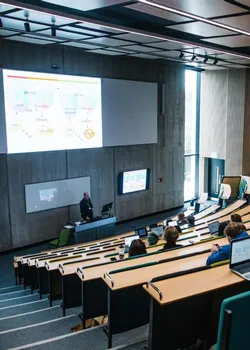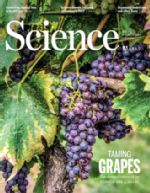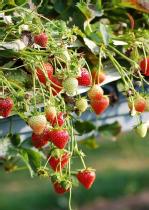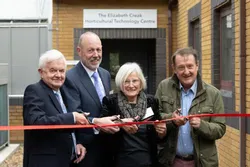Life Sciences News
See our Latest Journal Publications
National Organic Month: Warwick Crop Centre's pioneering research into low-input farming
During National Organic Month, the University of Warwick's Crop Centre takes a pioneering stance in the realm of low-input farming, shedding light on the concept of 'organic farming.'
Press Release (1 September 2023)
Robocrop: The robot assistants helping farmers to increase productivity
The future of farming could involve robots– as farmers seek to address labour shortages and increase crop yields.
Warwick Crop Centre and WMG are working in close collaboration to combine their robotics expertise and plant science expertise to investigate how they can apply autonomous robotics to greenhouses and croppable fields.
Press Release (25 August 2023)
The sound of the underground: What noisy worms tell us about soil health
Researchers are listening to earthworms to monitor soil health, in what could be a major innovation for maintaining soil health. In the first study of its kind, scientists are using a technique called ecoacoustics to listen to the activity of earthworms and other invertebrates in the soil. The theory is that a noisy soil is a healthy soil – and that the sounds generated in soil can be recorded, measured and used to evaluate soil condition. Press release (14 July 2023)
Jackie was interviewed about the research by David Gregory-Kumar for BBC Midlands Today.
Watch the interview (16 July 2023)
Historical medicine suggests a new way to use modern treatments
Combining honey and vinegar could be an old, yet new, way of treating persistent infections. The mixture of honey and vinegar, also known as oxymel, has been used as a medical treatment throughout history and now scientists have established that this combination could have modern applications in the treatment of wounds. New research by Dr Erin Connelly, Dr Freya Harrison and team, published in Microbiology, is the first comprehensive exploration of how the mixture could be applied to modern medicine and improve treatments for infections.
Press release (13 July 2023)
ENABLE workshop: Are the university learning environments as inclusive as we think?
 On Friday 29 September 2023, the School of Life Sciences will be hosting a free workshop: "Are the university learning environments as inclusive as we think? An investigation from the awarding perspective".
On Friday 29 September 2023, the School of Life Sciences will be hosting a free workshop: "Are the university learning environments as inclusive as we think? An investigation from the awarding perspective".
Based on a thorough data analysis from recent years and first-hand practical experience, the workshop will identify existing reasons for lack of inclusivity and unbiased awarding in biological science and related degree streams.
The workshop participants, comprising academic leaders, teaching professionals and a diverse student community, will also provide on consensus recommendations on how to close existing awarding gaps for a more inclusive learning and teaching environment throughout the UK.
Consensus recommendations will be published in a peer-reviewed journal.
Helping plants and bacteria work together reduces fertiliser need
Today, published in Microbiome, Dr Beatriz Lagunas and colleagues at the Universities of Warwick and Justus Liebig (Germany) have shown a new way to boost plant nutrient uptake and growth. This could reduce the need for fertilisers, an input to agriculture which can be harmful for the environment. Fertilisers can run into waterways, or get broken down by microbes in the soil, releasing the potent greenhouse gas nitrous oxide into the atmosphere.
Press release (3 July 2023)
The first British Baked Beans could be on the breakfast menu thanks to University of Warwick research
Professor Eric Holub, a plant scientist at Warwick Crop Centre, has developed Haricot bean varieties which can be sown in early May and harvested as a dry grain before mid-September, matching the UK's warmer months. Until now, it has been impossible for farmers to grow the haricot variety used for baked beans in the UK because they are incompatible with the climate.
Press Release (16 June 2023)
The story was also on BBC Breakfast. Watch it on iPlayer (from 22m 30s)
Faculty Post Doc Prizes awarded to Amol Bhandare and Richard Guillionneau
Each year, the Faculty of Science, Engineering and Medicine (SEM) funds a prize for the best Warwick-affiliated research output from an Early Career Researcher (ECR). Each department nominates a winner out of the applications received after a judging process as determined by the Faculty. This year the School of Life Sciences has awarded two prizes:
- Dr Amol Bhandare
- Dr Richard Guillioneau
The Panel recognised the scientific excellence of the research published in these outputs and the leading roles that both researchers had taken in conceiving and undertaking the research.
New discovery stops bacterial virus contamination
A new discovery by Dr Antonia Sagona and colleagues could help stop bacteria being contaminated with viruses, reducing disruption and decreasing costs in industry and research.
Press Release (18 April 2023)
Two domestications for grapes
 Professor Robin Allaby gives his perspective in Science, on the evolutionary events that led to grape domestication. The article made the front cover.
Professor Robin Allaby gives his perspective in Science, on the evolutionary events that led to grape domestication. The article made the front cover.
Read the paper (3 March 2023)
Growing British - Professor Napier on Radio 4
 On Thursday 2 March, Professor Richard Napier was featured on the BBC Radio 4 Farming Today programme talking about a new green paper “Growing British” he helped to create. It’s a strategy highlighting how to increase fruit and veg production in the UK. Listen (from 1:14).
On Thursday 2 March, Professor Richard Napier was featured on the BBC Radio 4 Farming Today programme talking about a new green paper “Growing British” he helped to create. It’s a strategy highlighting how to increase fruit and veg production in the UK. Listen (from 1:14).
A “zinc” in the armour: could metal help combat common superbug?
A new study has shown that zinc plays a key role in a hospital superbug, that doctors struggle to treat due to its resistance to antibiotics.
Press Release (15 February 2023)
Bacteria communicate like us – and we could use this to help address antibiotic resistance
Like the neurons firing in human brains, bacteria use electricity to communicate and respond to environmental cues. Now, researchers have discovered a way to control this electrical signalling in bacteria, to better understand resistance to antibiotics.
In the study published in Advanced Science, Dr Munehiro and colleagues, report a major step forward in regulating bacterial electric signals with light.
Press Release (13 February 2023)
Four new academic positions available in the School of Life Sciences
We wish to appoint four excellent and ambitious early to mid-career principal investigators who are capable of developing innovative and original research programmes:
- 2 x Permanent positions focused on Host-virus Interactions
- 1 x Permanent position focused on Plant Virology
- 1 x Permanent position focused on Host Responses to Microbes
£1.7m containment facility will help tackle globally important diseases and prepare for future pandemics
A £1.7m laboratory building which will investigate infectious diseases has opened at the University of Warwick – helping to tackle some of the most globally important human diseases and prepare for pandemics of the future. The new containment suite will enable scientists to conduct cutting-edge research into infectious diseases, including tuberculosis (TB), influenza and COVID-19.
Press release (8 December)
Weldon Prize for SPI-M-O and Zeeman modellers
Professor Matt Keeling and Dr Louise Dyson were part of the Warwick Zeeman team invited to attend the Weldon Prize giving in Oxford.
This prize is awarded annually for ‘noteworthy contributions to the development of mathematical or statistical methods applied to problems in Biology’. This year it was given to the SPI-M-O group (part of SAGE) in recognition for their work during the COVID-19 pandemic.
£1.5m Crop Research Centre opens at University of Warwick
 A facility using gene-editing technology to improve quality, resilience and sustainability of vegetable crops has opened at the University of Warwick.
A facility using gene-editing technology to improve quality, resilience and sustainability of vegetable crops has opened at the University of Warwick.
The Elizabeth Creak Horticultural Technology Centre (ECHTC), which also contains The Jim Brewster Laboratory, is a £1.5 million facility which will use cutting edge techniques such as gene-editing to improve vegetable crops.
Addressing issues relating to disease resistance, crop yield, adaptability to climate change and nutritional value in horticultural plants, the research will help with the key global challenges of climate change and feeding the world’s growing population.
Press Release (10 November 2022)
Blog: Research culture from a technical point of view
Our Research Facility Manager, Dr Sarah Bennett, gives her thoughts on research culture from a technician's perspective.
Read the blog (9 November 2022)
International collaboration identifies new molecular targets in crop resistance
Professor Murray Grant is part of a team of international researchers who have identified and classified new isomers that could help develop more robust and resistant crops – via synthetic biology approaches.
Press Release (4 November 2022)

